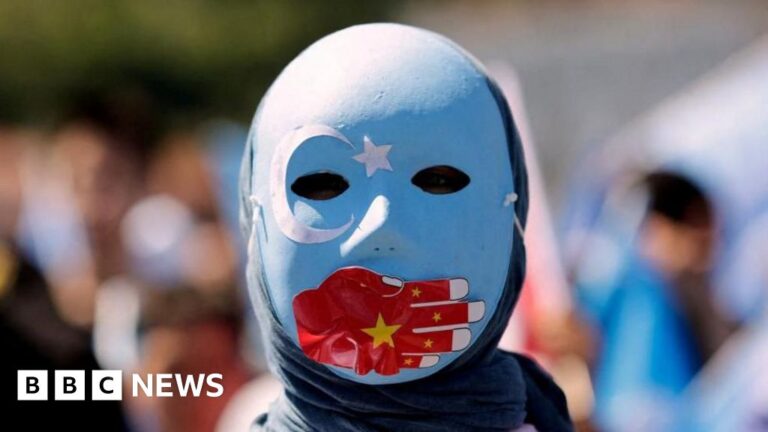- author, Anna Ramche
- role, BBC News
China has renamed hundreds of villages in Xinjiang in an attempt to erase the Uighur Muslim culture, according to Human Rights Watch (HRW).
The group reported that hundreds of villages in Xinjiang with names linked to Uighur religion, history and culture were renamed between 2009 and 2023.
A study based on China’s own data found that words such as “sultan” and “shrine” have disappeared from place names, being replaced by words such as “harmony” and “happiness.”
The BBC has contacted the Chinese Embassy in London about the allegations.
In recent years, Chinese authorities have carried out radical reforms to Xinjiang society in an attempt to assimilate the Uighur ethnic minority into mainstream Chinese culture.
Researchers from HRW and the Norway-based organization Uyghur Help looked at the names of villages in Xinjiang over a 14-year period on the website of China’s National Bureau of Statistics.
The investigation found that the names of 3,600 of the 25,000 villages in the Xinjiang Uyghur Autonomous Region were changed during this period.
HRW said most of the name changes appear to be “mundane”, but about a fifth – or 630 changes – removed references to Uighur religion, culture or history.
Words that are meaningful to the Uighurs of China include: HodjaAs a title for Sufi religious leaders, and as a political or honorific title Sultan and Plead – These words have been replaced with words such as “harmony” and “happiness” which HRW claims reflect “recent Chinese Communist Party ideology”.
In one example highlighted by the report, Ak Mestit (“White Mosque”), a village in Akto county in southwestern Xinjiang, was renamed Unity Village in 2018.
Most of China’s Uighur Muslims live in northwestern China, including Xinjiang, Qinghai, Gansu and Ningxia.
There are about 20 million Muslims in China, which is officially an atheist country but says it is tolerant of religious freedom.
But in recent years, observers say they have witnessed a crackdown on organized religion across the country.
According to HRW, renaming of villages and towns appears to be ongoing, but most of the names were changed between 2017 and 2019.
The group claims this coincides with an escalation of hostility against Uighurs in the Xinjiang Uighur Autonomous Region.
“Chinese authorities are changing the names of hundreds of villages in Xinjiang from ones that are meaningful to Uighurs to ones that reflect government propaganda,” said Maya Wang, deputy China director at Human Rights Watch.
“These name changes appear to be part of the Chinese government’s efforts to erase the cultural and religious expression of the Uighur people,” she added.

